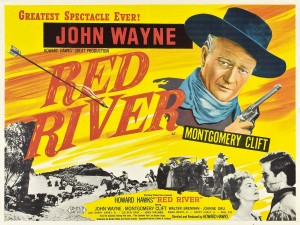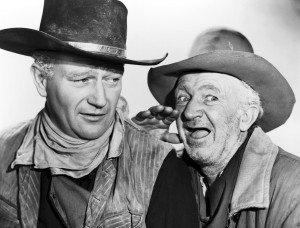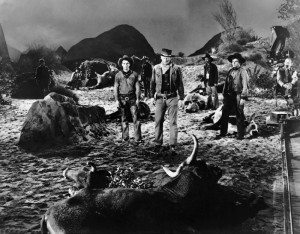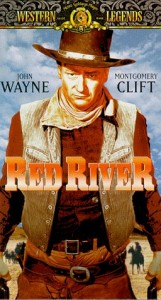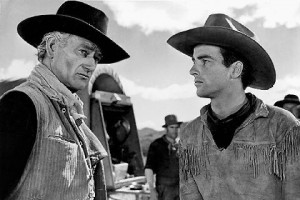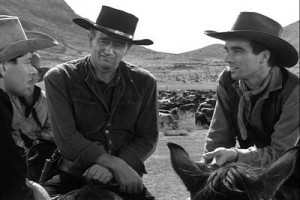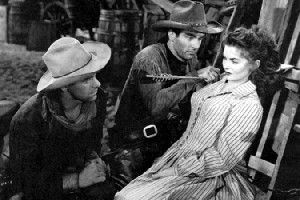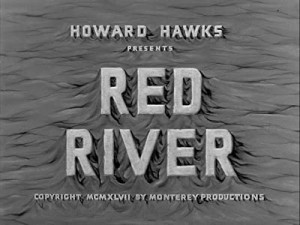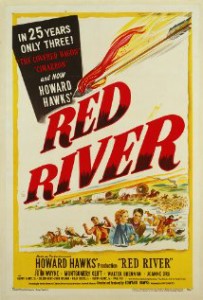Red River ***** (1948, John Wayne, Montgomery Clift, Joanne Dru, Walter Brennan) – Classic Movie Review 275
Producer-director Howard Hawks’s mammoth epic 1948 classic Western gives John Wayne one of his best ever roles as Thomas ‘Tom’ Dunson, a tyrannical empire-building cattleman. He seems to relish kicking up the dust, playing opposite an actor he didn’t much care for, Montgomery Clift, who gives an equally strong performance in his star début as Wayne’s adopted son Matt Garth.
Based on a story by Borden Chase, with a screenplay by him and Charles Schnee, the action takes place both during and after a stunningly handled cattle drive north from Texas to the Missouri railhead. During it, the two men clash. Matt takes the herd away from Dunson and heads off to a new railhead in Kansas. An enraged Dunson, swearing vengeance, sets off in pursuit.
Just when a violent showdown between the duo seems inevitable, the script surprisingly opts for a compromise instead and gives love interest Joanne Dru (as Tess Millay) a rather unconvincing speech to wrap up the action. And then Hawks steals a scene from Howard Hughes’s The Outlaw for a slam-bang finale, which landed the cash-strapped production in a plagiarism writ from Hughes that was only stopped by a personal appeal from Wayne. It was made in 1946 and this held up its release for two years.
This is basically a Western retelling of a Mutiny on the Bounty-style yarn, with Dunson as the tyrannical Captain Bligh character and Garth as mutineer Fletcher Christian. Chase called it ‘Mutiny on the Bounty with saddles and stirrups’.
As such, it succeeds in almost all departments, from the chalk-and-cheese star pairing, Dimitri Tiomkin’s rip-roaring score, Russell Harlan’s excellent black and white cinematography to the distinguished supporting character acting from the likes of Walter Brennan (the only actor to date to win three Oscars for Best Supporting Actor), Colleen Gray, John Ireland, Noah Beery Jnr, Harry Carey Jnr, Harry Carey Snr, Paul Fix and Hank Worden, all of them seeming perfectly at home in the West. This is the only film where Carey Jnr and Snr appeared together, though they share no scenes.
But it’s Wayne’s film and he gives a most memorable. brilliant performance, certainly high up there in his top ten appearances. Rival director John Ford is quoted as saying after seeing the film: ‘I never knew the big son of a bitch could act.’
Of course, you could say that colour would have been great here but actually it’s really only the dead-looking studio interiors representing exterior shots that make it feel a little dated and slightly let it down. But, hey, nobody’s perfect.
It’s yet another case of a great movie winning no awards at all. Borden Chase was Oscar nominated for the original story as was Christian Nyby for Best Film Editing. But no wins.
There also exists a 125-minute alternate version of Red River, usually shown on TV, narrated by Walter Brennan to shots of the pages of a diary. The Director’s Cut restores the eight minutes of cut footage. But, according to film director/historian Peter Bogdanovich, the shorter version should be the Director’s Cut, as Hawks was unhappy with the pacing of the 133 minute cut.
The right-wing and homophobic Wayne and Brennan were strongly opposed to Clift’s liberal political views and his homosexuality and they had nothing to do with him outside of filming.
It was remade as a passable TV movie in 1988 with James Arness and Bruce Boxleitner.
© Derek Winnert 2013 Classic Movie Review 275
Check out more reviews on http://derekwinnert.com

